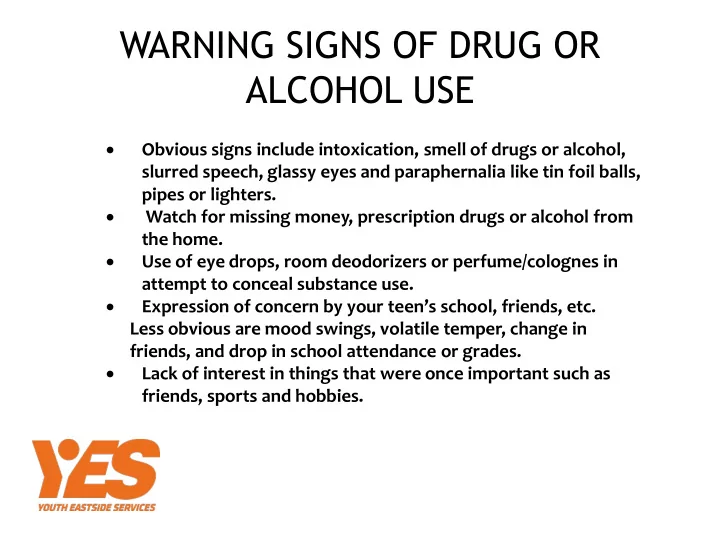

WARNING SIGNS OF DRUG OR ALCOHOL USE Obvious signs include intoxication, smell of drugs or alcohol, slurred speech, glassy eyes and paraphernalia like tin foil balls, pipes or lighters. Watch for missing money, prescription drugs or alcohol from the home. Use of eye drops, room deodorizers or perfume/colognes in attempt to conceal substance use. Expression of concern by your teen’s school, friends, etc. Less obvious are mood swings, volatile temper, change in friends, and drop in school attendance or grades. Lack of interest in things that were once important such as friends, sports and hobbies.
What to do if you’re concerned about your teen or a teen you know Stay calm and tell your teen that you know he or she using. Approach it as a family problem, expressing love and concern. Be a parent―not a friend, and set clear boundaries and realistic consequences. Be prepared to withhold privileges (anything outside of food, shelter and clothing), including smartphone access. Know where your children are, who their friends are and how they spend free time. Keep the lines of communication open. If a teen continues using, get her or him a substance use assessment and counseling.
Resources • Community resources • Youth Eastside Services in Bellevue, Kirkland and Redmond and in many schools 425.747.4937 • Washington Recovery Helpline 1.866.789.1511 • Alanon/Alateen 206.625.0000 • Alcoholics Anonymous 206.587.2838 • Narcotics Anonymous 206.790.8888 • Lakeside-Milam Recovery Centers 1.800.231.4303 • www.nida.org www.mfiles.org • www.LearnAboutMarijuana.org www.drugfree.org
• “The truth of the matter is all people who begin using alcohol or other drugs do so believing they are in control of their chemical use. This belief, however, doew not change the fact that one out of eight people who choole to use mood-altering substances becomes addicted and never foresees it happening. » Jeff and Debra Jay, Love First
Recommend
More recommend